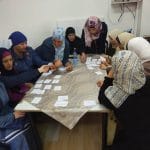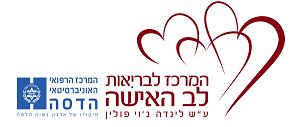Why Do Arab Women get Heart Disease Earlier
 Women in the Arab community have higher rates of heart disease, and they tend to become ill much younger. We went out into the community to learn what challenges they face as they seek to care for themselves.a
Women in the Arab community have higher rates of heart disease, and they tend to become ill much younger. We went out into the community to learn what challenges they face as they seek to care for themselves.a
We conducted three focus groups between June and August 2019, for Arab women in different regions in East Jerusalem. Group participants included women aged 26-50.a
We learned a lot from these groups, and they have given us a lot to think about, as we seek to empower these women to get the care and services they need. Here is some of what we heard from them:
* Severe difficulty in communication with medical staff, especially with physicians
– Hard to understand doctors’ instructions
– Hesitation about asking questions
* Doctors don’t stay long in the same place or position
* Doctors do not discuss screening tests
* Language barrier – a lot of information is available in Hebrew and English, but not in Arabic
* Many women do not understand blood-test results
* Fear of what medical testing may show leads to avoidance of testing
* Lack of knowledge regarding rights within the medical system
* Lack of knowledge about where to seek reliable medical advice (information is often obtained via “Dr. Google “ or youtube)
* Many women suffer from passive smoking as their husbands smoke inside the home
* Women have very little free time making it difficult to care for themselves
* High levels of stress
* Emotional eating
* Social isolation
The preferred intervention method is interactive workshops and discussion groups.
These data have guided us as we construct we have adapted our health literacy intervention program to address women from this culture. The workshops will utilize the “teach-back” method in which participants are asked to state in their own words, important information – to ensure comprehension.
Some of the highlights of this program:
Patient doctor interaction and patient rights: Targeting skills involved in preparation for doctor visits and maximizing those visits i.e. preparing a list of questions, symptoms, medications and family history, as well as why it is important to share this information with the doctor. Practicing assorted methods to help participants understand and remember the doctors’ instructions
Know your numbers – How to interpret certain measures, such as glucose, HDL, LDL, and additional measures such as BP and BMI.
Screening– What screening is important to conduct, and when
Cardiovascular wellness – How to recognize the signs and symptoms of a “woman’s heart attack” and how to prevent it
Passive and active smoking – Increasing awareness to the dangers of both active and passive smoking
The pilot program is scheduled for October, with mothers from one of the schools that participated in our health promoting schools program. Following evaluation, the program will be revised and perfected to be tested on a larger scope.
Search
Recent Posts
Abuse and Heart Disease
Abuse and Heart Disease: Exposure to trauma and...The Fake News Fiasco
We are exposed to a tremendous amount of inform...Coaching For Change
The Pollin Center’s health coaching group is an...When on-line is off limits: Innovative Corona-tailored health promotion program for Ultra-orthodox women – Chevruta L’Chaim
Ultra-Orthodox (Haredi) women have worse health...21444
The stress, apprehension and the fears coupled ...
